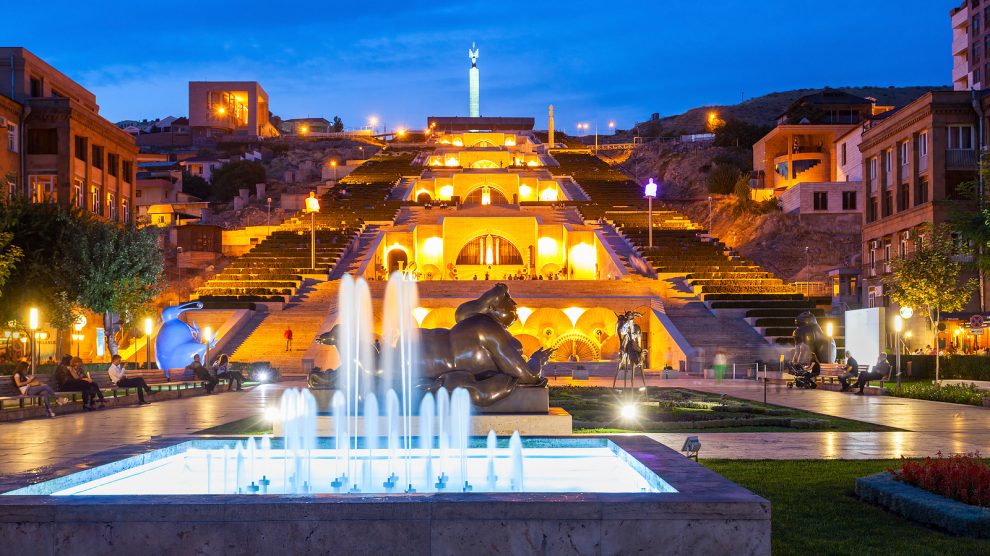Despite Western misperceptions, little has changed in the geopolitics of the South Caucasus. Armenia remains enmeshed with Russia and Azerbaijan remains outside Russia’s sphere of influence.
Western journalists continue to misread the South Caucasus. Optimistic and triumphant statements about Armenia integrating into Europe are stated alongside unresearched comments announcing Azerbaijan is aligning with Russia.
Both these claims are untrue. The geopolitics of the South Caucasus has changed to some degree but fundamentally it remains stable.
- How Armenia and Azerbaijan finally made peace
- Armenia should support regional cooperation to back its European integration
- The success of the EU’s 2004 enlargement must drive a new wave of expansion
Nikol Pashinyan, who came to power in a popular revolution in 2018, is the first Armenian leader to espouse discourse in favour of integrating into Europe. But discourse does not change geopolitical fundamentals on the ground.
Earlier Armenian leaders, who remain in opposition, were pro-Russian and Pashinyan has yet to escape from their enmeshing of Armenia within Russia’s sphere of influence. Many of Armenia’s rulers came from Karabakh, hence they were dubbed the ‘Karabakh Clan’.
The ‘Karabakh Clan’ integrated Armenia more closely into Russia’s sphere of influence than any other former Soviet republic, including Belarus. Russians patrolled Armenia’s borders and airports until a few months ago. While these forces have been replaced by Armenian border guards, Russia continues to control two military bases in Armenia.
More importantly, Armenia is a founding member of the CSTO (Collective Security Treaty Organization), Moscow’s attempt to re-create a structure like the Warsaw Pact which became defunct when the Soviet empire disintegrated. Pashinyan has frozen Armenia’s membership in what is a stagnant CSTO but has yet to announce its departure.
Azerbaijan, Georgia, and Uzbekistan withdrew from the CSTO in 1999 when Russia was ruled by President Boris Yeltsin. If Pashinyan decided to withdraw Armenia, he would be facing a more bellicose and nationalist Russian president in Vladimir Putin.
Can country leave the EAUA?
Armenia’s pro-Russian geopolitical orientation had widespread support until the 2018 revolution. Five years earlier, Russian pressure on Armenia led to it cancelling signing an Association Agreement with the EU and joining the Eurasian Economic Union (EAEU), Putin’s Eurasian alternative to the EU. Armenians did not protest this betrayal of Armenia’s European orientation. As Politico wrote, ‘Armenia chooses Russia over the EU’.
In Ukraine, similar Russian pressure led to a mass uprising against President Viktor Yanukovych’s turn away from Europe. Some 100 protestors died and thousands were wounded in what was dubbed the Euromaidan Revolution of Dignity. Yanukovych fled from Ukraine, Euromaidan revolutionaries came to power and signed an Association Agreement with the EU.
Western commentators who extol Pashinyan’s pro-European rhetoric fail to explain that no country can be in two customs unions. To sign an Association Agreement with the EU, which had been the intention eleven years ago, Armenia must first ‘Armexit’ from the EAEU.
No member of the EAEU has yet tested whether Putin would allow it to withdraw. The legal basis for the UK’s withdrawal from the EU was based on Article 50 of the Treaty of the European Union. No such article exists in EAEU documents.
Pashinyan has not suggested Armenia should seek NATO membership as a replacement for the CSTO. The Armenian prime minister probably feels this would be too provocative to Russia considering how the Kremlin launched military aggression against Georgia in 2008 and Ukraine since 2014, two countries which had aspired to join NATO.
One way, or the other
Pashinyan undoubtedly would like Armenia to integrate with the EU. But at times his discourse is confusing, seemingly claiming Armenia could be a member of both the EAEU and integrate into the EU Customs Union; it cannot.
Pashinyan has yet to understand that Armenia’s European future is linked to Ukraine’s military victory. A weakened or defeated Russia, coupled with a discredited and ousted Putin, would be unable to block Armenia’s withdrawal from the EAEU and even the CSTO. In August 1991, a weakened Soviet Union following the failed hardline coup was unable to block the exit of fifteen republics.
In 2020 and 2023, the CSTO did not intervene in defence of Armenia as Azerbaijan never attacked Armenian territory. In both instances, Baku launched military action against Armenian forces occupying lands that were internationally recognised as Azerbaijani territory.
Azerbaijan is not a member of the EAEU and has no intention to join the Kremlin’s economic union. Azerbaijan withdrew from the CSTO in 1999 and as a leading member of the Non-Aligned Movement, has no intention of rejoining the Kremlin’s fake imitation of the Warsaw Pact.
The geopolitical situation in the South Caucasus remains stable. Rhetoric aside, Armenia continues to remain integrated into the Russian-led CSTO and EAEU and, alongside Belarus, has Russian military bases. Non-aligned Azerbaijan is developing regional unity through the Organisation of Turkic States and is not contemplating joining the Russian-led EAEU or CSTO.
Azerbaijan’s closest allies are very different: Turkey, Pakistan, and Israel—even though the first two have problematic relations with Jerusalem. Iran and India are Russia’s long-term allies, the former is a major supplier of military equipment, and the latter is the main purchaser of its oil.
Despite Western misperceptions, little has changed in the geopolitics of the South Caucasus. Armenia remains enmeshed with Russia and Azerbaijan remains outside Russia’s sphere of influence.
Unlike many news and information platforms, Emerging Europe is free to read, and always will be. There is no paywall here. We are independent, not affiliated with nor representing any political party or business organisation. We want the very best for emerging Europe, nothing more, nothing less. Your support will help us continue to spread the word about this amazing region.
You can contribute here. Thank you.


